Documents used along the form
When buying or selling a mobile home in Nevada, several documents may accompany the Mobile Home Bill of Sale. Each of these forms serves a specific purpose in ensuring a smooth transaction. Here is a list of commonly used documents in this process.
- Title Transfer Document: This document officially transfers ownership of the mobile home from the seller to the buyer. It is essential for registering the new owner with the state.
- Purchase Agreement: This contract outlines the terms of the sale, including the price, payment method, and any contingencies. It protects both parties by clarifying expectations.
- Affidavit of Affixation: If the mobile home is permanently attached to land, this affidavit confirms that it is no longer considered personal property. It is necessary for property tax purposes.
- Inspection Report: An inspection report details the condition of the mobile home. It may identify any repairs needed, helping the buyer make an informed decision.
- Loan Documents: If the buyer is financing the purchase, various loan documents will be required. These may include a loan application and a promissory note.
- Insurance Certificate: This document provides proof of insurance coverage for the mobile home. It is often required by lenders before finalizing the sale.
- Disclosure Statement: This statement informs the buyer of any known issues with the mobile home, such as structural problems or past damage. It ensures transparency in the transaction.
- Tax Documents: These documents may include property tax records or statements. They provide information about any outstanding taxes owed on the mobile home.
Having these documents ready can facilitate a smoother transaction and help both parties understand their rights and responsibilities. Each form plays a crucial role in the overall process of buying or selling a mobile home in Nevada.
